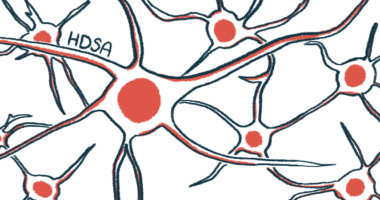A trip to the pharmacy becomes a valuable lesson
What I've learned about picking up my wife's Huntington's disease medication

In 2018, my wife, Jill, was diagnosed as gene-positive for Huntington’s disease (HD). In the months leading up to her diagnosis, she’d begun experiencing depression and anxiety, as well as other HD symptoms, which started her down the long road of finding helpful medications.
At first, she had trouble finding the right type and dosage. She battled nausea, sleeplessness at night and sleepiness during the day, dry mouth, and other medication side effects.
As Jill’s husband, I can’t change how the medications affect her, but I can help in other ways, such as getting her prescriptions filled, picking them up, and bringing her ginger ale and crackers for her nausea.
One night after work, Jill asked me to pick up her prescription. I was happy to help. I went to the pharmacy and got her medicine, but when I arrived home, she gave me an odd look.
“What’s wrong?” I asked.
After opening the package, she told me there should be three medications, not just one. She looked at the one I was able to get, and noticed the directions and quantity were different from what her doctor had prescribed.
Always double-check
Jill was a pharmacy technician and worked in doctors’ offices when she was younger, so she’s always understood the healthcare system better than I do. Luckily for me, that means she takes care of anything medical. I’ve been happy to let her do so, but as her HD progresses, I’ll need to take on more of those tasks.
The next day, I called the pharmacy. They said the prescription I picked up was correct, and that there were two other medications for Jill that had not been picked up.
I called Jill’s doctor, and his office shared with me what was sent to the pharmacy. It didn’t match what I picked up, so I had the doctor call the pharmacy and speak with them. It turned out that the doctor did send the correct prescription, but our insurance wouldn’t approve it without a prior authorization. So the pharmacy filled it slightly differently, in a way our insurance would pay for.
We eventually got everything corrected, but I learned a valuable lesson: Always know the name of the medication the doctor prescribed, as well as the dosage and quantity you should receive.
I hope Jill’s Huntington’s disease will be cured one day and I won’t have to learn anything more about her medications. But until then, we have compiled a list of everything she takes, as well as any other medical information I should know. Most importantly, I will remember to always check that I’ve received the correct medication for Jill before I leave the pharmacy.
Note: Huntington’s Disease News is strictly a news and information website about the disease. It does not provide medical advice, diagnosis, or treatment. This content is not intended to be a substitute for professional medical advice, diagnosis, or treatment. Always seek the advice of your physician or other qualified health provider with any questions you may have regarding a medical condition. Never disregard professional medical advice or delay in seeking it because of something you have read on this website. The opinions expressed in this column are not those of Huntington’s Disease News or its parent company, Bionews, and are intended to spark discussion about issues pertaining to Huntington’s disease.








Leave a comment
Fill in the required fields to post. Your email address will not be published.